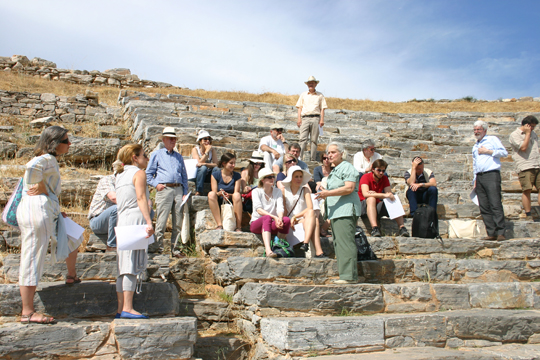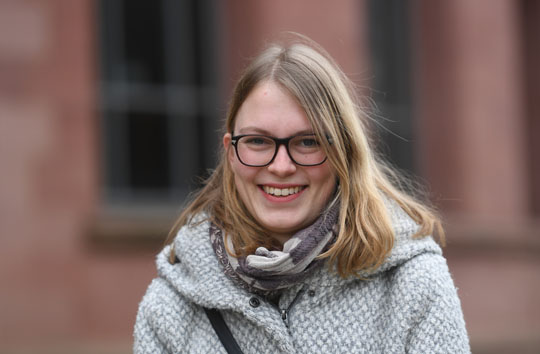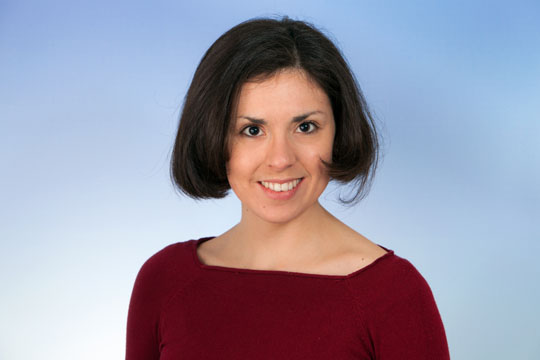European Research Foundation
Freiburg, Mar 16, 2018
Twelve partner universities in eight European countries: the European Master’s in Classical Cultures is an international degree course in classical studies focusing on the subjects of Greek and Latin philology, ancient history and classical archeology. Now, seven more international cooperations are being introduced.
 During an intensive course for the European Master’s in Classical Cultures in Athens, students and teachers viewed ancient rural settlements in Attica – this is the Theater of Rhamnous.
During an intensive course for the European Master’s in Classical Cultures in Athens, students and teachers viewed ancient rural settlements in Attica – this is the Theater of Rhamnous.
Photo: Ralf von den Hoff
“My subject, classical archeology, has to operate internationally,” says Professor Ralf von den Hoff of Freiburg. The same is true of other areas of classical studies which deal with the ancient history of Greece and Rome. And it is a fact that the small institutes typical of the specialism often offer teaching and research in too few subject areas. As a result, changing university can be particularly rewarding for students who want to experience the variety of their specialism. So it made sense for a group of European classical scholars to put into effect what the Bologna reform was in fact supposed to do: a truly international European Master’s degree.
A degree with three roots
“Our European Master ‘Classical Cultures’, or EMCC for short, has three roots,” says von den Hoff, who is coordinating the entire degree program, “The internationalism of small and academically-oriented specialisms, the Erasmus program and the Bologna reform.” Today, twelve universities from eight European countries are involved in the program. The latest to join was Palermo in 2017, and in 2018 Salamanca will be the first Spanish university to join. At the heart of the degree are the specialisms Greek and Latin philology, ancient history and classical archeology.
Despite existing contacts through the European exchange program Erasmus, it took five years until the cooperation agreement for a joint degree involving the participating universities was signed in 2009, von den Hoff explains. The basic idea is that students on the four-semester Master’s complete their studies in different languages at at least two universities – and receive a degree from both universities.
Two majors, one minor
Students select two majors and one minor from the three subject areas of classical archeology, ancient history and classical philology. In addition, they can improve their basic knowledge of Latin and Greek or learn an ancient language such as Hebrew or Accadian, and select two modules from the range of extensions. These could include for instance courses in prehistoric or Byzantine archeology, the ancient history of law, or numismatics and epigraphy, but also methodological courses such as museology.
There is also a Summer School, “the heart of our degree”, says Ralf von den Hoff: for five days all Classical Cultures students meet at a thematically-interesting location in Europe, where they visit museums or excavations and introduce their Master’s projects. These few days involve intensive work together with teachers in many languages, says von den Hoff, “It is definitely a serious challenge to the students, but a good one – it is creating a European Research Foundation.”
PhD, teaching, museums
A placement also forms part of the curriculum. Many graduates go on to take a PhD, some choose to become teachers or work in museums, and a few move for instance into the media. Applicants for the degree must have two European languages at a suitable academic level; English does not count towards this as there are no English-language universities represented in the association. Knowledge of at least two of the three core areas as well as proficiency in Latin or ancient Greek are also required – e.g. with a Bachelor’s degree.
Students are taking on a lot with the degree, says von den Hoff, “But they are enriched by the experience and receive intensive support.” He sits down with every student, plans their study, helps with language skills and subject areas: anyone who is interested in Etruscology is in good hands in Innsbruck, Perugia specializes in ancient history, Salamanca in classical philology, Athens in ancient epigraphy. “It’s all very complex,” says von den Hoff, “but with our students it’s really fun. They really experience Europe as an academic region.”
Thomas Goebel
Classical Cultures Master's degree
● The course of studies takes four semesters.
● Master's students study in different languages at a minimum of two universities.
● The course leads to a degree from each of two universities.
● Applications may be made up until 15 May.
More information
 Elisa Beck studies in Freiburg and Perugia.
Elisa Beck studies in Freiburg and Perugia.
“Unlike an Erasmus semester abroad, during my stay at the University of Perugia I was a ‘real’ student, [and] it definitely makes a difference. I also received a lot of personal support there. It’s very positive for planning your studies to speak to someone who knows what happens where. Another advantage of the Master’s for me was that I encountered entirely new areas of archeology in Perugia.”
Photo: Patrick Seeger

Beatrice Gavazza is a PhD student and studied in Freiburg and Perugia.
“I found it totally interesting to get to know the perspectives of two universities in different countries. Each country has its own special characteristics – in Italy you learn a lot from books and lectures, in Germany you have to give more presentations and write academic papers. I definitely found taking written examinations in German a challenge. And you have to be well organized, but fortunately we received good support. Now I’m doing my PhD – with a scholarship that I wouldn’t have got if I hadn’t studied abroad.”
Photo: Private

